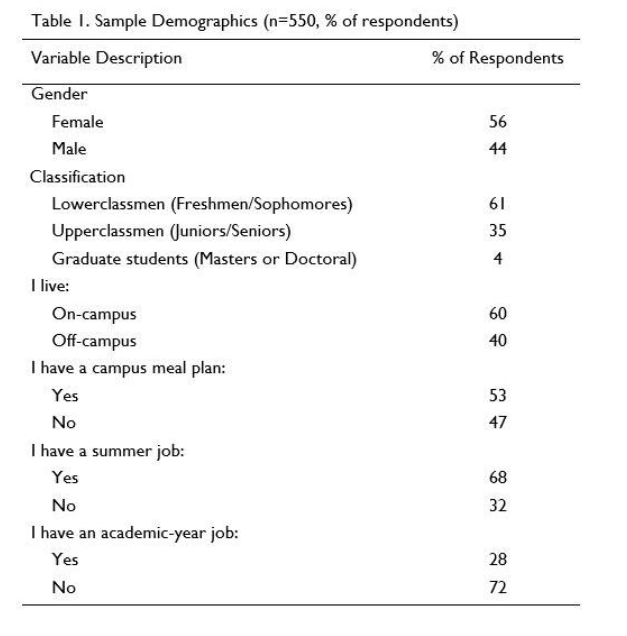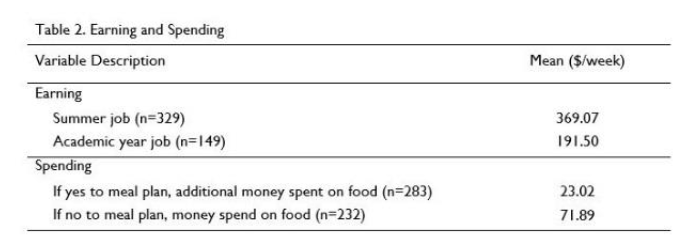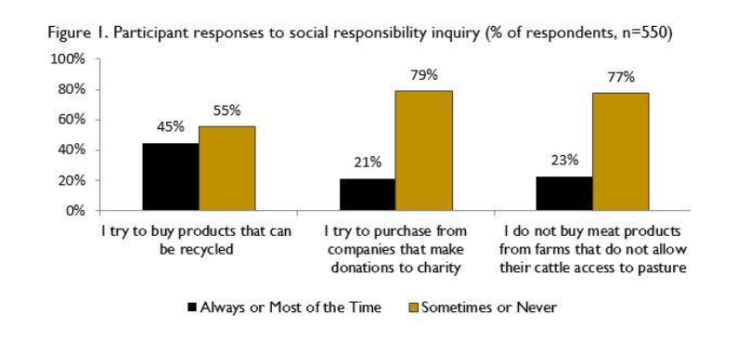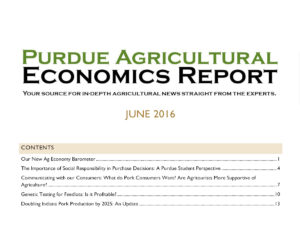The Importance of Social Responsibility in Purchase Decisions: A Purdue Student Perspective
June 12, 2016
PAER-2016-06
Unattributed
Between tuition, books, food, and fun, the university experience requires making a variety of purchase decisions. Some of those purchases may have societal consequences like buying coffee from a shop that uses recyclable “to-go” cups, or asking whether the company that sells class supplies donates to charity, or whether the local burrito place buys meat from farms that treat animals a certain way.
The broad ideas of recycling, charitable donations, and animal welfare could be important attributes to consider when making purchases, especially if the student values social responsibility. The university setting also has some unique food spending options such as campus meal plans.
Where does the money come from to make purchases? For some students, summer and academic year jobs provide a source of income. In order to gain more insight into these questions, Purdue University students were asked about earnings, food spending, campus meal plans, and if they consider social responsibility issues in some specific purchasing decisions.
WHAT 550 STUDENTS TOLD US!
Between August 24 and August 27, 2015, a single-page paper survey was distributed to Purdue University students. The survey locations were at five high-traffic campus locations: the Purdue Memorial Union, the Beering Hall Loeb Fountain area, the Cordova Co- recreational Sports Center lobby, Wiley Dining Court, and the Engineering Fountain area. The survey was distributed and collected by graduate student researchers. Student respondents were not offered incentives or compensation for their participation and no identifying information was collected.
Students were asked to report demographic information such as gender , student classification (upperclassmen, lowerclassmen, graduate student), if they lived on or off campus, had a campus meal plan, dollars spent on food, and if they had a summer and/or academic year job. In addition, respondents were asked three questions about social responsibility in their personal purchasing practices.
A total of 550 students completed the survey (Table 1). Fifty-six percent were female, 61% were lowerclassmen (freshmen and sophomores), 35% were upperclassmen (juniors and seniors) and 4% were graduate students. A majority of students (60%) lived on-campus, and a majority (53%) had a campus meal plan, the remaining 40% lived off-campus, and 47% did not have a campus meal plan.
Sixty-eight percent reported having a summer job, while only 28% reported having a job during the academic year. Respondents having a summer job reported average weekly earnings of $369.07 per week. Those with an academic year job had average earnings of just $191.50 per week (Table 2). It is interesting to note that the weekly earnings during the summer was nearly double the weekly earnings during the academic year, and the number of students holding a job during the academic year was less than half of those with summer jobs. Though this is not surprising since they likely have more time to work in the summer.
The 53% of respondents having a meal plan were also asked to report additional money spent on food. The average additional spending reported was $23.02 per week. The 47% of students who reported having no campus meal plan spent an average of $71.89 per week on food. Remember, students living on campus, primarily lowerclassmen, generally have little food storage capacity and limited access to food preparation facilities, which may make campus meal plans attractive to them. For perspective, the suggested meal plan that Purdue University offered as the “best deal” costs around $160 per academic week and provides three meals a day plus snacks and guest meal options.1 The most limited plan provides only one campus meal a day and costs around $88 per academic week.2 Even with the amenities of campus meal plans, students often reported spending additional money for food outside the plan.
DO STUDENTS CONSIDER SOCIAL RESPONSIBILITY IN PURCHASES?
Students responded to three statements about socially responsible purchasing: I try to buy products that can be recycled; I try to purchase from companies that make donations to charity; and I do not buy meat products from farms that do not allow their cattle access to pasture. Respondents rated their own behavior as: Always, Most of the time, Sometimes, or Never, These were regrouped into two categories, Always or Most of the time, and Sometimes or Never.
In response to, I try to buy products that can be recycled, 45% of respondents selected Always or Most of the time. For the remaining two statements, I try to purchase from companies that make donations to charity and I do not buy meat products from farms that do not allow their cattle access to pasture 21% and 23% of respondents replied Always or Most of the time respectively. This means that more than 20% of Purdue students surveyed responded affirmatively in describing their buying behavior for all three socially responsible issues.
SUMMARY
We surveyed 550 Purdue students to learn more about their work and their earnings. We also gained insights into how they spend money for food during the academic year and we were particularly interested in whether they consider social responsibility in some specific purchase decisions.
Among the respondents, 68% had summer jobs but only 28% had jobs during the academic year. On average, weekly earnings in the summer was $369, nearly double the weekly earnings during the school year.
Of those students in our survey, 60% lived on campus and 53% had a campus meal plan. Campus meal plans may not be the lowest cost option for the total dollars spent on food, but grocery food access is limited, as are food storage and preparation facilities in some on- campus housing units. In addition, time for preparation and cleanup can be personally costly as well.
This Purdue student sample would fall within the millennial generation, who may consider the social implications of their consumption decisions more than older generations. We found evidence this was true on some specific issues for some proportions of respondents. Students were asked if they tried to buy products that could be recycled and 45% said that either always or most of the time this was true. Buying from companies that make donations to charity yielded 21% of the students answering affirmatively, and 23% indicated affirmation of a question on purchases related to animal welfare.
Purdue students have likely grown up hearing about recycling, so it is not surprising that a large percentage consider that issue when making purchase decision. Businesses donating a portion of their sales to charity and animal welfare issues are more recent, yet more than 20% of surveyed students indicated these were important influences on their consumption decisions. In future research it will be interesting to see if social responsibility in purchase decisions continues to become more important, also to identify which products are most affected, and to measure how much consumers are willing to pay for socially responsible attributes.



